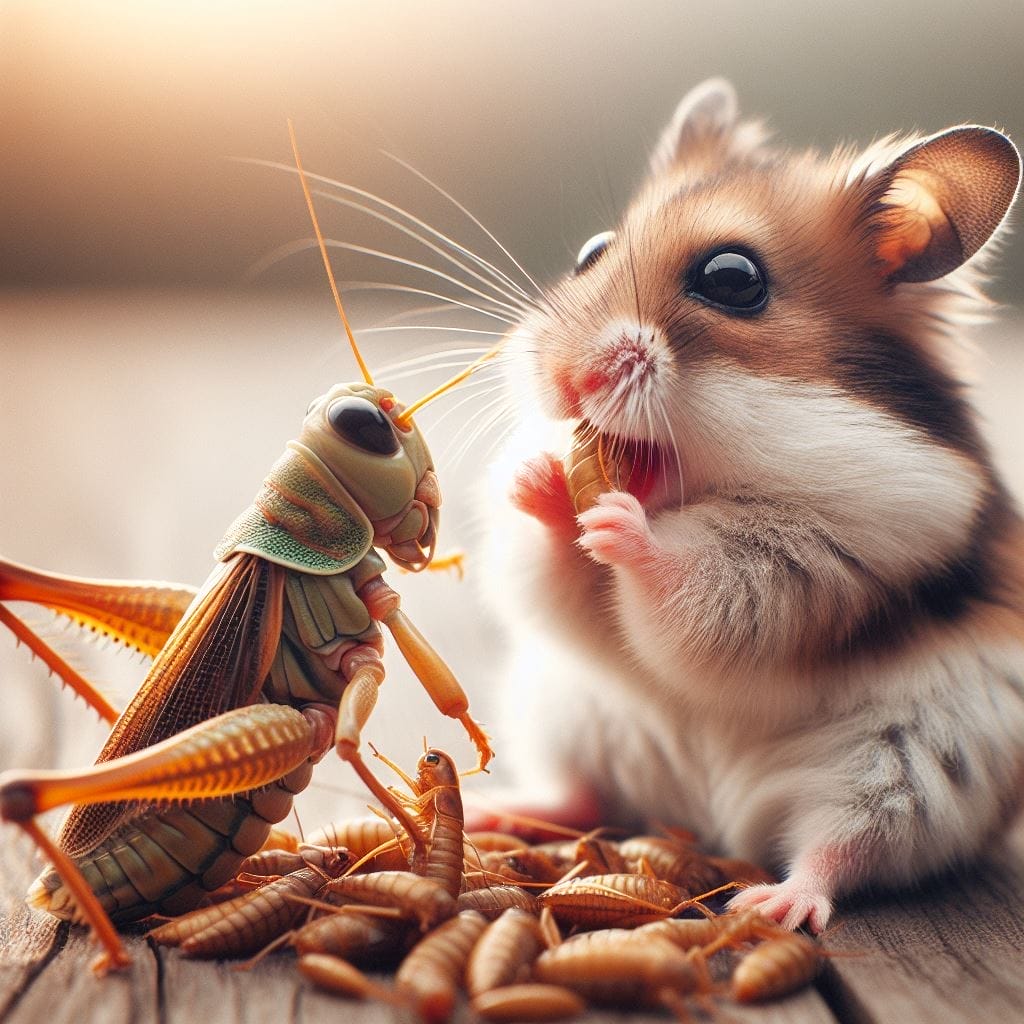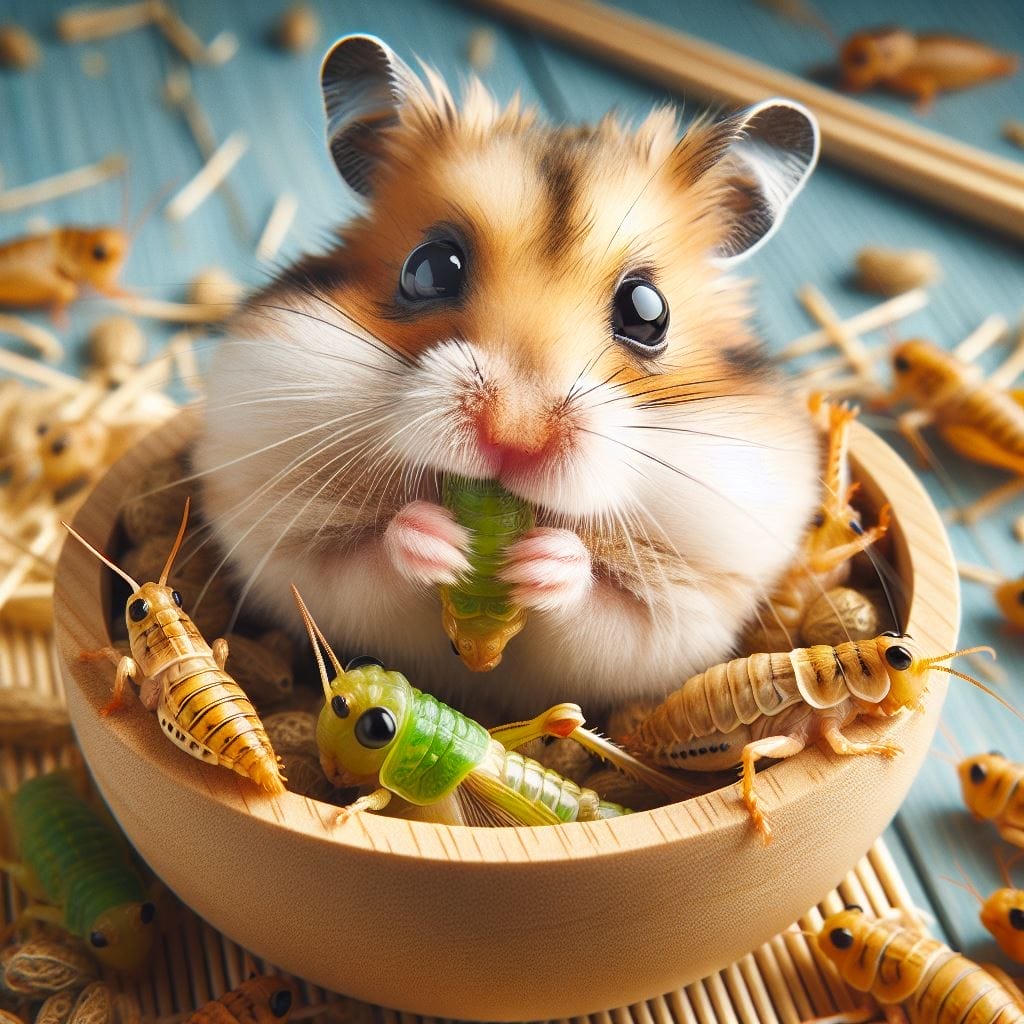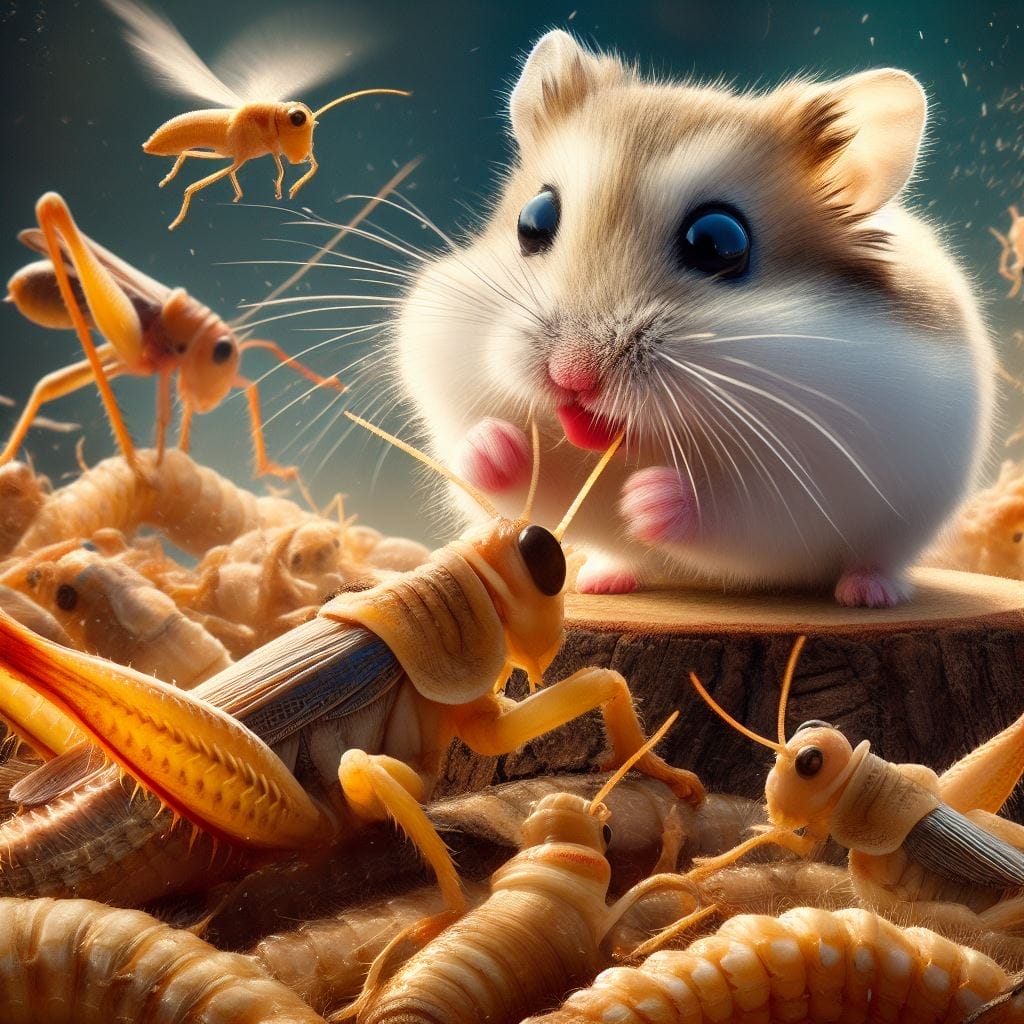Can Hamsters Eat Grasshoppers? Grasshoppers might not be the first treat that comes to mind when it comes to feeding your hamster, but these little insects can be a nutritious addition to their diet when given in moderation.
Introduce about Grasshoppers
Grasshoppers are insects belonging to the order Orthoptera, and they are found in various habitats worldwide. These insects are composed of exoskeletons, muscles, and other tissues.
Nutritional composition in Grasshoppers:
- Protein
- Fiber
- Vitamins (B12, A, E)
- Minerals (Iron, Zinc, Calcium)
- Chitin (from the exoskeleton)
Can hamsters eat Grasshoppers?
Yes, hamsters can eat grasshoppers as an occasional treat. Grasshoppers are a good source of protein and other nutrients that can benefit a hamster’s overall health.

Can Hamsters Eat Grasshoppers? While grasshoppers can be a nutritious addition to a hamster’s diet, it’s crucial to introduce them in moderation and as part of a balanced diet that primarily consists of high-quality hamster food and fresh vegetables.
Benefits of feeding Grasshoppers to hamster
Feeding grasshoppers to your hamster can provide several benefits:
- High protein content: Grasshoppers are an excellent source of protein, which is essential for a hamster’s growth, muscle development, and overall health.
- Vitamins and minerals: Grasshoppers contain various vitamins and minerals, such as vitamin B12, iron, and calcium, which are important for a hamster’s metabolism, blood formation, and bone health.
- Fiber: Grasshoppers provide a good source of fiber, which aids in digestion and prevents constipation in hamsters.
- Natural foraging behavior: Offering grasshoppers can encourage natural foraging behavior in hamsters, providing mental stimulation and enrichment.
Risk of feeding Grasshoppers to hamster
While grasshoppers can be a nutritious treat for hamsters, there are some potential risks to consider:
- Chitin: The exoskeleton of grasshoppers contains chitin, which can be difficult for hamsters to digest in large quantities.
- Parasites and bacteria: Grasshoppers caught from the wild may carry parasites or harmful bacteria, potentially causing illness in hamsters if not properly cleaned or cooked.
- Allergic reactions: Some hamsters may have allergic reactions to grasshoppers, which can cause digestive issues or skin irritations.
- Impaction: If fed in excess, the tough exoskeleton of grasshoppers can potentially cause intestinal impaction in hamsters.
Can Hamsters Eat Grasshoppers? If hamsters eat too much grasshoppers, they may experience digestive issues like constipation or diarrhea, as well as potential impaction from the exoskeleton. Excessive consumption can also lead to nutritional imbalances and obesity.

Symptoms of Grasshoppers Poisoning in Hamsters
While rare, grasshopper poisoning in hamsters can occur if they consume grasshoppers contaminated with pesticides or other harmful substances. Symptoms may include:
- Lethargy and weakness
- Loss of appetite
- Diarrhea or constipation
- Vomiting
- Tremors or seizures
- Respiratory distress
Can Hamsters Eat Grasshoppers? If you notice any of these symptoms after your hamster has consumed grasshoppers, seek immediate veterinary attention.
How much Grasshoppers can you give a hamster?
As a general guideline, adult hamsters can be given 1-2 grasshoppers per week as a treat, depending on their size and overall diet. It’s important to introduce grasshoppers gradually and in small amounts to monitor their reaction.
Can Hamsters Eat Grasshoppers? A suitable diet for a hamster should consist of a high-quality hamster food mix, supplemented with fresh vegetables, a small amount of fruit, and occasional treats like grasshoppers.

Alternatives and Supplements
If you’re looking for alternative protein sources or supplements for your hamster, consider the following options:
- Mealworms (high in protein, encourage foraging behavior)
- Crickets (similar nutritional benefits as grasshoppers)
- Unsalted and roasted seeds (e.g., pumpkin, sunflower)
- Cooked lean meats (e.g., chicken, turkey)
- Boiled eggs (provide protein and calcium)
- Cottage cheese (source of protein and calcium)
- Timothy hay (provides fiber and promotes dental health)
- Fresh vegetables (e.g., carrots, broccoli, spinach)
Popular hamster food brands:
- Oxbow
- Kaytee
- Higgins
- Vitakraft
- Sunseed
Can Hamsters Eat Grasshoppers?
Yes, hamsters can have grasshoppers as an occasional treat in moderation.
“Should I have consultation with vet before feeding Grasshoppers to my hamster?”
It’s recommended to consult with your veterinarian before introducing any new food item to your hamster’s diet.
“What are symtomps of Grasshoppers Poisoning in hamster?”
Symptoms of grasshopper poisoning in hamsters may include lethargy, loss of appetite, diarrhea, vomiting, tremors, seizures, and respiratory distress.
“How to introduce Grasshoppers to hamsters?”
Introduce grasshoppers gradually and in small amounts, monitoring your hamster’s reaction and adjusting accordingly.
“Can Syrian hamsters eat Grasshoppers?”
Yes, Syrian hamsters can eat grasshoppers as an occasional treat in moderation.
“Can Roborovski hamsters eat Grasshoppers?”
Yes, Roborovski hamsters can eat grasshoppers as an occasional treat in moderation.
“Can Russian dwarf hamsters eat Grasshoppers?”
Yes, Russian dwarf hamsters can eat grasshoppers as an occasional treat in moderation.
“Can Teddy bear hamsters eat Grasshoppers?”
Yes, Teddy bear hamsters can eat grasshoppers as an occasional treat in moderation.
“Can Chinese dwarf hamsters eat Grasshoppers?”
Yes, Chinese dwarf hamsters can eat grasshoppers as an occasional treat in moderation.
“Can Dwarf hamsters eat Grasshoppers?”
Yes, dwarf hamsters can eat grasshoppers as an occasional treat in moderation.
Can Hamsters Eat Grasshoppers? If you take the time to educate yourself about hamster care and respect your pet’s personal space while also giving it adequate hamster breed, hamster food, exercise, and entertainment, as well as maintaining a clean environment and good health, you and your hamster should enjoy a long and happy life together. Visit our site http://hamstercare.net/
